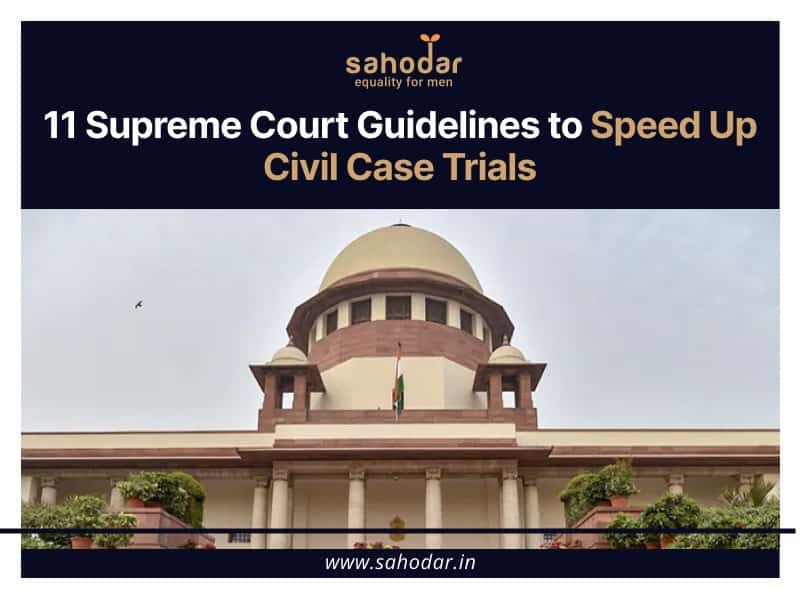The Supreme Court of India has recently issued a comprehensive set of directives to address the long-standing issue of a backlog of pending cases in the country’s legal system. These directives, encompassing both substantial and procedural elements, are aimed at enhancing the efficiency of the judicial process, ensuring timely justice, and alleviating the burden on the courts. In this legal analysis, we will delve into the specifics of these directives, providing a detailed examination of each one.
Directive 1: Proper Service of Summonses
This directive addresses the procedural aspect of legal proceedings, emphasizing the necessity of adhering to statutory requirements concerning the service of summonses. District and taluka-level courts have been expressly instructed to ensure the accurate and timely service of summonses, as prescribed by law. This directive falls in line with the principles of natural justice, which require that all parties involved in a case be duly notified and have the opportunity to participate.
Directive 2: Timely Submission of Written Statements
A key procedural step in litigation is the submission of written statements outlining the parties’ positions. The second directive focuses on streamlining this process. It urges courts to set a specific time limit for filing these statements, ideally within 30 days from the initiation of proceedings. However, it allows for extensions beyond this period with the condition that written justifications for such extensions are provided. This provision promotes the efficient handling of cases and reduces unnecessary delays.
Directive 3: Alternative Dispute Resolution (ADR)
The third directive introduces the concept of Alternative Dispute Resolution (ADR) as an integral component of the legal process. It encourages parties involved in legal disputes to explore ADR mechanisms as an alternative to traditional court proceedings. This not only provides parties with more control over dispute resolution but also lightens the caseload on the judiciary. In the event of ADR being chosen, a specific date is to be set for the resolution attempt. If ADR proves unsuccessful, the trial is to commence immediately the following day. This not only expedites the resolution process but also incentivizes parties to consider ADR.
Directive 4: Framing of Legal Issues
When ADR is not chosen or proves unsuccessful, the court is directed to promptly frame the legal issues that require determination. This directive is crucial for clarifying the scope of the dispute and ensuring that the trial is focused and efficient.
Directive 5: Scheduling of Trials
Trial scheduling is a critical procedural element that often affects the length of proceedings. The fifth directive underlines the significance of scheduling trial dates in consultation with legal representatives. The objective is to ensure that trials proceed on a daily basis whenever feasible. This approach maximizes the efficient use of time and resources and avoids the unnecessary stretching of trial periods.
Directive 6: Efficient Case Management
Efficient case management is pivotal to reducing overcrowding in court dockets and preventing adjournments. Judicial officers at the district and taluka levels are tasked with maintaining case diaries to ensure that the number of cases listed for trial on a given day aligns with the court’s capacity. This measure helps to minimize adjournments and the associated inconvenience to stakeholders.
Directive 7: Legal Education and Refresher Courses
While directives 1-6 focus on procedural and structural aspects, the seventh directive introduces an element of continuous legal education. Legal counsel representing parties are encouraged to partake in educational programs that familiarize them with rules designed to limit the scope of disputes. Bar Associations and Bar Councils are entrusted with the responsibility of organizing periodic refresher courses, preferably through virtual means.
Directive 8: Cost Payment Provisions
Another crucial aspect of litigation is the question of costs. The eighth directive emphasizes the provisions for the payment of costs as a mechanism to deter unwarranted adjournments. Courts are mandated to ensure that costs are paid, and in the event that adjournments are granted, the opposing party is to be adequately compensated. This provision ensures that the financial implications of delaying proceedings are borne by the party responsible for the delay.
Directive 9: Prompt Oral Arguments and Judgments
Once a trial is concluded, the timely delivery of judgments is of paramount importance. The ninth directive calls for the prompt hearing of oral arguments and the immediate delivery of judgments. This step significantly reduces post-trial delays and ensures that justice is swiftly administered.
Directive 10: Reporting on Long-pending Cases
Transparency and oversight are essential elements of a well-functioning judicial system. Directive 10 mandates that district and taluka courts report monthly statistics on cases pending for more than five years. These statistics are then forwarded to the Principal District Judge and a review committee for further evaluation and appropriate action. This reporting mechanism ensures that long-pending cases receive the necessary attention and resources to facilitate resolution.
Directive 11: Oversight by State Chief Justices’ Committees
The eleventh directive introduces the concept of oversight at the state level. State Chief Justices’ committees are to convene at least once every two months. These committees provide directives, ensuring that corrective measures are expeditiously undertaken by the concerned courts. Furthermore, they maintain vigilant oversight of old cases that have been pending for more than five years.
Conclusion:
The Supreme Court’s directives represent a comprehensive approach to address the backlog of pending cases and streamline the judicial process in India. These directives, spanning procedural, educational, and oversight aspects, serve as a roadmap for courts at all levels to expedite the resolution of legal disputes. It is anticipated that these measures will contribute to more efficient and effective case management, ultimately benefiting all stakeholders within the legal system. The comprehensive nature of these directives highlights the judiciary’s commitment to ensuring timely justice for all.

